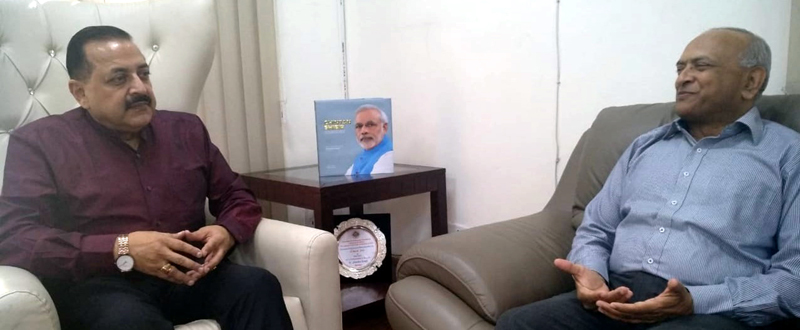
Excelsior Correspondent
NEW DELHI, Nov 25: Union Minister of State (Independent Charge) Development of North Eastern Region (DoNER), MoS PMO, Personnel, Public Grievances & Pensions, Atomic Energy and Space, Dr Jitendra Singh said here today that in the last four and half years, Modi Government has brought most of the public authorities under the purview of the RTI act, which is in keeping with the commitment to ensure maximum transparency in the working of these institutions. The Department of Personnel and Training(DOP&T), which is the nodal department for the Right to Information and Central Information Commission, has so far successfully covered nearly 2000 public authorities under the RTI Act, he said.
Dr Jitendra Singh made these observations when the Central Information Commissioner (CIC), R.K. Mathur called on for a courtesy call on the completion of his term as CIC.
Lauding the achievements of the last over four years, Dr Jitendra Singh said when the Modi Government came in, there were very few public authorities under the purview of RTI Act, but a fast – track process was initiated to make the RTI more effective and more inclusive. This, he said, had also prompted the various State Governments to pick up the cue and one of the commendable examples is the decision by the Jammu and Kashmir Governor Satya Pal Malik to bring the J&K Bank under the purview of RTI Act.
In addition, Dr Jitendra Singh noted that the filing of RTI has been made much more convenient and easy with the use of latest technology. There is now a portal and an App, as a result of which, any citizen can file an RTI from his mobile phone, at any time of the day or night, and from anywhere.
The disposal time of the RTI application received in the Central Information Commission has been drastically reduced, said, Dr Jitendra Singh, and added that the pendency has also considerably reduced in comparison to what it was before 2014.
In the DOP&T, Dr Jitendra Singh said, we have tried to sincerely live up to Prime Minister Modi’s commitment of maximum governance with minimum Government, maximum transparency and maximum citizen-participation. He said, there has also been a successful effort to compile inputs from the various RTIs received, in order to prepare research manuals for planning future strategies and improve upon the existing methodologies.

